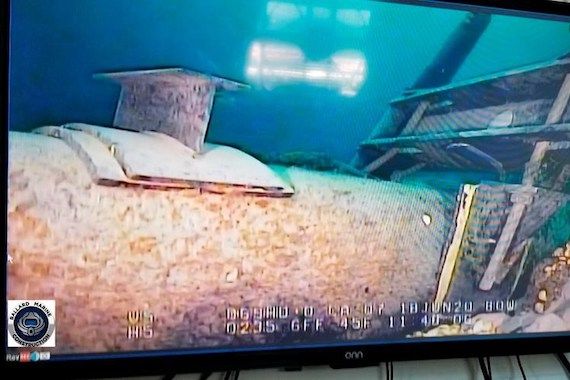
The report, commissioned by Environmental Defense, recommends upgrading Enbridge’s new Line 78 pipeline to handle most of what Line 5 currently delivers to Ontario and Quebec, as well as several states in the US Midwest. (Photo: The Canadian Press)
Washington – A new report from a Canadian environmental group says alternatives to Line 5 already exist should the controversial trans-border pipeline shutdown.
The report, commissioned by Environmental Defense, recommends upgrading Enbridge’s new Line 78 pipeline to handle most of what Line 5 currently delivers to Ontario and Quebec, as well as several states in the US Midwest.
Calgary quickly dismissed the idea as “misleading,” insisting that Line 78 was already full and unable to handle the NGLs carried by Line 5.
Michigan is in court with Enbridge over plans to shut down Line 5, fearing an environmental catastrophe in the Strait of Mackinac, where the pipeline crosses the Great Lakes.
Line 78 runs through the southern part of the state connecting Sarnia, Ontario, with intersections in northwest Indiana at the southern tip of Lake Michigan, and connects to existing pipelines from Superior, Wisconsin, where Line 5 originates.
It was completed in 2015 as a replacement for Line 6B, better known as the pipeline that spilled 3.1 million liters of oil into the Kalamazoo River in Michigan in 2010.
The report, which acknowledges the continuing need for fossil fuel supplies even during the transition to renewable energy, says the remaining lost capacity in Line 5 could be addressed by a combination of trains and ship tanks.
“The closure of Line 5 is inevitable, either by court order or due to a rupture,” the report stated, noting that either outcome would lead to power shortages in the countless areas and facilities that depend on it.
“The best solution is a planned shutdown as Enbridge, refiners and governments determine the best way to meet demand without Line 5. What this report makes clear is that the options are there.”
Enbridge replies ‘misleading plan’
But Enbridge insists that is not the case.
“The only thing this misguided plan has proven is that closing Line 5 will have a significant and immediate impact on the region’s energy supply and hard-working businesses and families in Michigan, Ohio, La Pennsylvania and Canada’s two largest provinces,” the company said in a statement.
“It doesn’t mean anything.”
The two sections of Line 78 are currently capable of transporting 570,000 and 500,000 barrels of oil per day, but they could be increased to 800,000 and 525,000, respectively.
In comparison, the maximum daily capacity of the fifth pipeline is 540 thousand barrels, although no pipeline is currently operating at full capacity, the report notes. “This means that there is already excess capacity on Line 78 to largely offset the closure of Line 5.”
The report says that in the “restricted” Line 78 scenario, the closing of Line 5 would leave a shortfall of 255,000 barrels per day to be filled elsewhere, while the shortfall would narrow to 119,000 barrels under the expanded capacity model.
It is estimated that two or three additional road trains that already carry the oil can handle that additional 119,000 barrels, as can one additional marine tanker. It expects gasoline prices to increase by 1.8 cents a liter.
The report concludes that “there will be difficult choices to be made as to what is best, but it is entirely possible to meet current demand without the fifth line”. “The basic idea is that there is enough capacity to cover any shortfall in revenue that may result from the closing of the fifth line.”
The legal battle continues
Meanwhile, the battle between Enbridge and the state of Michigan is still making its way through the courts, much of it hinging on vague questions about whether the dispute falls in federal or district court.
Enbridge, unions and Ottawa all favor the first option, which is why federal government lawyers filed an amicus brief earlier this month urging the judge to keep the pipeline running while he negotiates with the US State Department.
Officials from the two countries met at least once in mid-December to discuss the terms of a 1977 treaty aimed at preventing disruptions to the flow of oil and gas across the border. Court documents say they plan to meet again in “early 2022”.
Michigan Governor Gretchen Whitmer, a Democrat and close ally of President Joe Biden whose political fortunes depend on the support of the state’s environmental groups, has ordered the closure of the Fifth Line in November 2020, fearing an environmental catastrophe in the strait.
Enbridge responded by replying, arguing that Ms Whitmer and state attorney general Dana Nessell had exceeded their jurisdiction and that the case should be heard in federal court. Late last year, U.S. District Judge Janet Neff agreed with Enbridge on the issue of jurisdiction.
That was when Ms. Whitmer and Ms. Nessel abruptly withdrew their lawsuit, choosing instead to focus on a separate, but similar, case that had been debated in circuit court but had been dormant since 2019.
Critics want Line 5 closed, arguing that it is only a matter of time before disaster strikes in one of the region’s most important watersheds.
Supporters see the pipeline as a vital and much-needed energy source for many Midwestern states, including Michigan, Ohio and Pennsylvania, particularly when it comes to propane. It is also a major source of feedstock for important refineries on the northern side of the border, including those that supply some Canadian airports with jet fuel.


